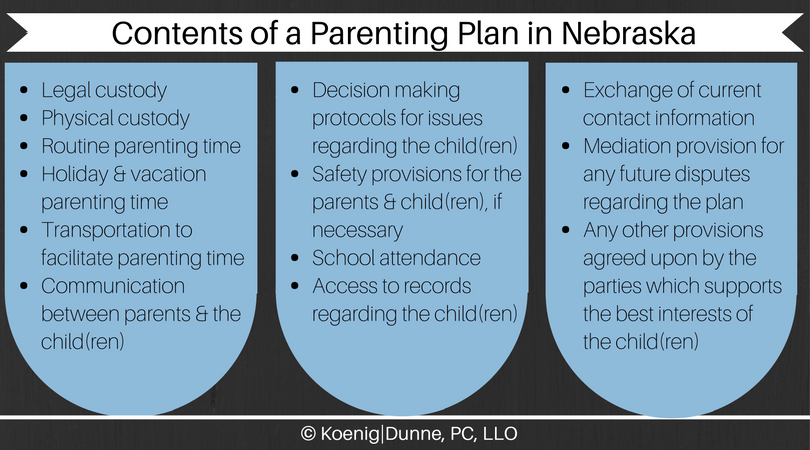The Nebraska Parenting Act requires all parents involved in a legal action regarding custody or parenting time to have a parenting plan. A parenting plan is a document that details how you and the other parent will parent your child upon divorce or separation.
To finalize a parenting plan, you have three options:
- You and the other parent may agree on the terms of the plan, with or without the help of legal counsel.
- You and the other parent may use a parenting plan mediator to reach agreement regarding the terms of the plan.
- If an agreement regarding all aspects of the plan cannot be reached, the court will order the terms of the parenting plan.
The content of the parenting plan will address in detail many issues, including the following:
- Legal custody
- Physical custody
- Routine parenting time
- Holiday and vacation parenting time
- Transportation to facilitate parenting time
- Communication between the parents and the child(ren)
- Decision making protocols for certain issues regarding the child(ren)
- Safety provisions for the parents and child(ren), if necessary
- School attendance
- Access to records regarding the child(ren)
- Exchange of current contact information, including address and phone numbers
- Mediation provision for any future disputes regarding the plan
- Any other provisions agreed upon by the parties which supports the best interests of the child(ren)
The overarching purpose of the parenting plan is to support both parents’ relationships with their children and ensure that, despite their divorce or separation, parents can maintain, to the greatest extent possible, an ongoing involvement in their children’s lives.
Once the parenting plan is finalized by the court, it is a court order that parents must follow. However, parents can agree to temporarily alter the provisions of the plan if needed. For example, parents can agree to switch parenting weekends due to scheduling conflicts. However, no temporary change in the plan will be enforceable unless an amended plan is approved by the court.
Angela Lennon

